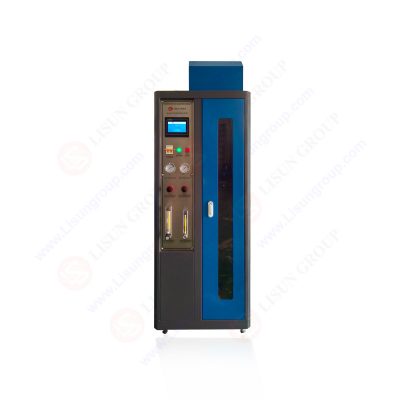
The electric wire and cable burning tester is a precision instrument specifically designed to determine the non-propagation of flames of cables under fire conditions. This equipment is suitable for various cable types including single plastic wires, control cables, cross-linked cables, elevator cables, ship cables, and mining cables. Additionally, it can conduct vertical burning tests for high self-extinguishing low smoke halogen-free flame-retardant polyolefin insulation materials and 105°C low smoke halogen-free flame-retardant irradiated polyolefin insulation materials.
The design of the electric wire and cable burning tester adheres to the following national standards:
• GBT 18380.11-2008 “Tests on electric cables and optical cables under fire conditions – Part 11: Test for vertical flame propagation for a single insulated wire or cable – Apparatus”
• GBT 18380.12-2008 “Tests on electric cables and optical cables under fire conditions – Part 12: Test for vertical flame propagation for a single insulated wire or cable – 1 kW pre-mixed flame test method”
Furthermore, this equipment is effectively compliant with the international standard IEC 60332-1/2, ensuring international applicability and accuracy of test results.
RSB-WC Wire Cable Flame Tester
Key Features
• Automatic Ignition: Utilizes a high-voltage igniter for automatic ignition, ensuring ease of operation.
Corrosion Resistance Design: Designed with a structure resistant to smoke corrosion, enhancing longevity.
• High-Quality Components: Critical components are imported to ensure stability and reliability of the equipment.
• Digital Display and Automatic Control: Equipped with digital display timing functions, the test procedure is fully automated for convenient operation.
Operating Principle
The electric wire and cable burning tester employs a control circuit to manage the application time of the flame and operational procedures. The device provides a flaming combustion source to ensure the accuracy and repeatability of tests.
Applications
The vertical burning tester for electric wires and cables finds wide application in the cable manufacturing industry, construction industry, and quality inspection organizations. Through vertical burning tests, it effectively assesses the safety performance of electric wires and cables under emergency conditions, providing essential guidelines for design, production, and usage. Moreover, this equipment is used for researching new flame-retardant materials, developing high-performance electric wire and cable products, and establishing relevant industry standards. Continual optimization and improvement of testing methods by the vertical burning tester contribute to enhancing the safety performance of electric wires and cables, reducing fire risks, and safeguarding life and property.
Testing Procedure
• Preparation: Ensure a safe test environment free of flammable materials and check the burning tester for integrity. Prepare the cable samples by cutting them to specified lengths and diameters.
• Sample Installation: Secure the cable samples on the fixture of the burning tester in a vertical position. Adjust the burner position to a certain height above the cable.
• Start the Test: Ignite the burner to initiate the cable burning. Observe and record parameters such as burning time, burning length, smoke density, etc. Maintain a safe distance during the test to avoid injury from sparks.
• End the Test: Once the cable has burned completely or reached the predetermined time, turn off the burner and allow the sample to cool. Compile test data for analysis and evaluation of the cable’s burning performance.
This systematic approach ensures thorough assessment of electric wire and cable fire safety characteristics, contributing to enhanced product reliability and safety in various applications.
https://www.lisungroup.com/news/technology-news/electric-wire-and-cable-burning-tester-efficient-tool-for-assessing-cable-non-propagation-of-flames.html
.jpg)
.jpg)
Comments
Post a Comment